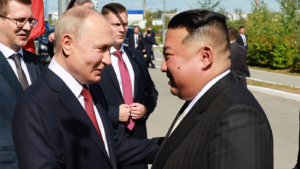The Unraveling of North Korea’s Military Ties to Russia: A Ticking Time Bomb

As global tensions escalate, the spotlight shines on unusual military alliances, particularly the one between North Korea and Russia. North Korean leader Kim Jong-un finds himself in a precarious situation as he navigates the choppy waters of international relations and domestic stability. Recent reports suggest that North Korea has refused multiple requests from Russia for the repatriation of North Korean soldiers killed in the ongoing conflict in Ukraine.
The Fear of Repatriation: A Regime on Edge
The regime’s reluctance to accept back its fallen soldiers stems from a profound fear of civil unrest. In a country where information is tightly controlled and dissent is brutally suppressed, the North Korean populace is largely unaware of the grim realities of war. Instead, they are bombarded with propaganda that paints life outside their borders as dire, elevating Kim’s curated image of invincibility.
What’s more troubling is Kim’s reported refusal to even accept injured soldiers back home. This begs the question: What happens when the war eventually ends? North Korean troops are now acutely aware of the stark contrasts between their lives and the freedom enjoyed by others abroad. With the internet penetrating deeper into the country’s borders despite censorship, the facade of a utopian North Korea is increasingly at risk of being shattered.
The Cost of Defecting: A Family Pact
The no-defect rule looms large over these soldiers, instilling a paralyzing fear: defecting could mean not just their own death, but a guaranteed execution or imprisonment of three generations of their family. This draconian policy creates a chilling effect, ensuring loyalty through fear rather than conviction.
Desperate measures have been reported among troops to evade capture. Ukrainian forces have described encounters where North Korean soldiers have opted for suicide rather than surrender, demonstrating the depths of desperation and loyalty they feel towards Kim Jong-un. One soldier reportedly cried out his leader’s name before taking his own life—a haunting testament to the regime’s grip on its forces.
The Unseen Consequences: Bodies Without Burials
As the conflict rages on, an estimated 3,000 to 4,000 bodies of North Korean troops lie unclaimed, awaiting proper burial. Moreover, between 10,000 to 12,000 men are actively fighting alongside Russian forces, potentially trading their lives for economic support from Moscow. This raises the stakes significantly; at what point does the loss of life outweigh the perceived benefits of allegiance to Kim?

A Revolutionary Cycle Approaches: Implications for Change
Adding fuel to the speculation of instability is the impending 72-year Revolutionary Cycle, which culminates in 2025. History shows that such cycles can herald significant change, and one must wonder whether North Korea’s military will remain unswervingly loyal in the face of devastating losses and the potential for upheaval.
The Two Possible Futures
-
The Loyal Soldier’s Return: What if those serving in Russia return home as staunch supporters of Kim’s regime? Could their combat experience reinforce Kim’s power, perpetuating a cycle of fear and repression?
- A Shift in Allegiance: Conversely, what if these soldiers return home questioning their loyalty? History has demonstrated that empires crumble when their military turns against them. These soldiers possess the potential to catalyze a revolutionary movement that could dismantle the Kim dynasty and liberate North Korea from decades of authoritarian rule.
At Extreme Investor Network, we believe it is crucial to keep a close eye on these evolving dynamics. The intersection of military loyalty, international relations, and internal dissent can create a volatile situation. More importantly, the actions taken by Kim and his regime in the coming years could reverberate far beyond the Korean Peninsula, influencing global economic and political landscapes.
Stay tuned for further insights on this unfolding situation, and join us as we explore the multifaceted nature of geopolitics and its implications for investors worldwide.

